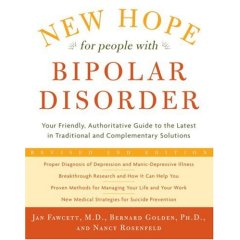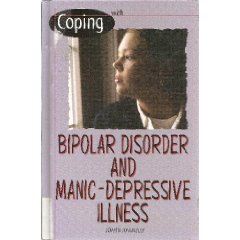 A Friendly Chat about Bipolar Disorder
A Friendly Chat about Bipolar Disorder, June
25, 2008
For twenty years, Dr. Wes Burgess has been writing down all the
questions asked by his bipolar patients. In this book he
thoughtfully answers each question, providing a safe friendly
environment for the reader.
What I appreciated most about this book was all the information
I had never read in other books on bipolar disorder. I had no
idea that left untreated, this disorder can grow worse as you
age. This is enough of a reason to convince anyone to keep
taking their medication. Stopping medications seems to be an
issue that the author addresses numerous times because
uncontrolled manic episodes can make the disease worse. It was
interesting to realize that it is high levels of adrenaline that
cause manic symptoms.
Suicide is also dealt with in this book. Thirty percent of
individuals with bipolar disorder will attempt to kill
themselves. Some of the other symptoms include: insomnia,
intrusive thoughts, rapid speech, memory problems, obsessions,
hypersomnia (sleeping during the day), spending sprees,
hypersexuality, anxious depression, fatigue, anxiety, social
isolation, fear, panic, paranoia and auditory hallucinations.
Left untreated or treated with the wrong medications this
disease gets worse over time. The author talks about medications
he prescribes and gives detailed information about each one. He
mentions Geodon and Ativan as well as numerous other medications
that work for bipolar disorder.
You may also want to read: New
Hope For People With Bipolar Disorder Revised 2nd Edition: Your
Friendly, Authoritative Guide to the Latest in Traditional and
Complementary Solutions
~The Rebecca Review

Bipolar Disorder
 An Essential Book on Bipolar Disorder
An Essential Book on Bipolar Disorder, June
8, 2008
"For many bipolar patients, the dark cloud of the illness
is leavened by silver linings-creativity, intelligence, and
drive. As a result, the bipolar spectrum is a more prevalent
phenomenon among those in the public eye: artists, performers,
writers, composers, and charismatic leaders."
Nancy Rosenfeld is a bipolar survivor who convinced Jan Fawcett
(one of the world's leading authorities on depression and
bipolar disorder) and Bernard Golden (a practicing psychologist
for more than 30 years) to coauthor this book. Since more than
2.5 million people suffer from bipolar disorder/manic depression
this is a much needed resource. This is the third book I've read
on this disorder and this is by far the most comprehensive.
The book begins by profiling several famous people who have the
disorder. Some of the main problems include mania, hypomania and
depression. This book explains the differences between
Schizoaffective Bipolar disorder, Bipolar I and Bipolar II
disorder. This book also lists a number of medications like
Lithium, Risperidone and Geodon that are helpful in treating the
disorder.
"Despite all the research demonstrating that people with
mental illness are actually less prone to violence than others,
many people erroneously associate aggressive behavior with
mental disorders." ~ pg. 153
The book becomes even more useful as you read about when
medications should be taken and what to watch for in regards to
side effects. A patient must at times choose between side
effects and suicidal tendancies. In the long run it is better to
deal with the side effects than to lose your life. If a pill
causes drowsiness then it might be better taken at night. Often
side effects can be treated by taking an additional medication.
The prevention of suicide is an essential chapter. It talks
about the importance of staying on medication and gives a list
of things you can do if you think someone may be suicidal. There
is also a Stress Questionnaire to establish your level of
stress. The authors explain why you should develop an adequate
support system and also give a list of books to read for further
information.
I can highly recommend this to families who are dealing with
bipolar disorder, to doctors who must address the many needs of
their patients and to those suffering with bipolar disorder.
"For many people with bipolar disorder, the turning point
in their life comes when they understand their situation, accept
responsibility for their actions, and are willing to work hard
to change their lives." ~ pg. 218
With so many people suffering from this disorder it is very
likely that you will meet someone in your life with this issue.
In order to understand what it is like to be bipolar this book
is essential. If you are suffering with bipolar disorder then
there is not a minute to lose and this book will give you hope
that you can be treated effectively. Since many doctors don't
have the time for detailed explanations this can also be used as
a companion to your present treatment.
~The Rebecca Review

Bipolar Disorder and Manic-Depressive Illness
 Adults will find this book useful...
Adults will find this book useful..., August
9, 2009
"Every seventeen minutes in America someone commits
suicide." ~ Pg. 34
Joann Jovinelly has written and especially helpful book about
bipolar disorder. This book helps you to identify which type of
bipolar disorder you have and then it explains the best
medications for your condition. Because this book seems to have
been written for children it may be overlooked by adults. It is
definitely more advanced than for age 9-12 and I wouldn't
recommend it for children unless they are very mature and have
been diagnosed with the illness. This book emphasizes the need
to stay on medication even when you are feeling well enough not
to take it.
What I found most enjoyable about this book was the short quotes
from people who have bipolar disorder. It was interesting to see
how they viewed their illness. Since over 2 million people
suffer from bipolar disorder in the United States this book is
needed and appreciated.
Of all the books I've read on bipolar disorder this one seemed
the most informative and detailed. It helped me understand the
different types of mania experienced and the types of depression
that are typical. I would recommend this book to anyone who
suspects they may be bipolar or to anyone who knows someone who
is bipolar. This book could help you get a better diagnosis and
there is also information on how to choose a doctor.
~The Rebecca Review
|